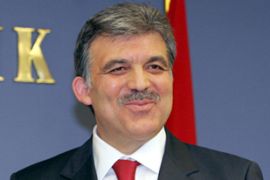Profile: Abdullah Gul
Abdullah Gul is set to become the 11th president of Turkey.

A Muslim, like Erdogan, and a founder member of the AK party, a point of contention surrounds his wife for wearing the Muslim headscarf, a source of friction with the secularists in Turkey.
Born in Kayseri in 1950, Gul graduated from Istanbul University with a degree in economics in 1971, and received a doctorate from the same university in 1983. During his graduate studies he attended programmes in Exeter and London, UK.
Gul participated in the foundation of Sakarya University‘s industrial engineering department, teaching economics there from 1980 to 1983.
From 1983 to 1991 he worked at Islamic Development Bank, in Jeddah, Saudi Arabia, as an economist, and became an associate professor in international economics.
In 1991, he became a member of the planning and budgetary commission in the Turkish parliament under the auspices of the Welfare party.
In 1993, he became deputy chairman of the Welfare party in charge of foreign affairs, and in 1995 joined the Turkish foreign affairs commission.
From 1996 to 1997, he served as a minister of state and government spokesman.
Following the exclusion of the Welfare party in 1999, Gul was re-elected to parliament for a third time as member of the Virtue party.
In 2001, Gul was awarded with a medal of the Council of Europe and became honorary associate of Council of Europe parliamentary assembly.
In August 2001, he became the founding board member of the Justice and Development party (AK party), and re-elected in November 2002 as prime minister to found the 58th cabinet.
Widely respected in Europe as a committed reformer, Gul presided over the launch of Turkey’s European Union talks after becoming deputy prime minister and foreign minister in March 2003.